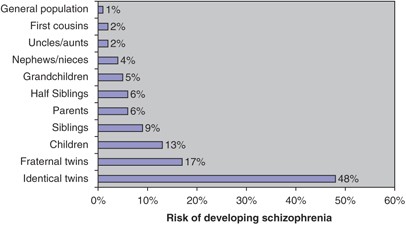- Get link
- X
- Other Apps
Not every study brought back correct feedback due to a lack of proper testing steps. The current belief is that there are a number of genes that contribute to susceptibility or pathology of schizophrenia but none exhibit full responsibility for the disease.
Inheriting Mental Disorders Healthychildren Org
Molecular Genetic Studies of Schizophrenia.

Is schizophrenia genetic. The ways that these genetic changes are related to schizophrenia are not well understood and the genetics of this disease is an active area of research. Schizophrenia is believed to. The genetic changes can also interact with environmental factors that are associated with increased schizophrenia risk such as exposure to infections before birth or severe stress during childhood.
Schizophrenia belongs to a group of pathologies known as complex genetic disorders. Our understanding of complex genetic disorders is still evolving as new experiments uncover novel mechanisms of disease. There have been many ideas.
Some linking specific genes to schizophrenia others linking clusters etc. However the fact is that. As discussed schizophrenia has a genetic component but no single gene has been identified as being responsible for developing the condition.
In comparison people who dont have a genetic link to the disorder have a 1 in 100 chance of developing it. Genetic factors include a variety of common and rare genetic variants. Getting Help for Schizophrenia Despite its profound life-altering nature schizophrenia can be successfully treated with a combination of individual and family therapy medication second-generation antipsychotics produce the best results and complementary therapies.
Researchers can argue that a higher percentage of individuals who have schizophrenic relatives develop this disease than members of the general population. The causes of schizophrenia include genetic and environmental factors. If you have a parent or close relative who has schizophrenia you have a one in ten chance of developing the disorder.
Possible environmental factors include being raised in a city cannabis use during adolescence infections the ages of a persons mother or father and poor nutrition during pregnancy. For example identical twins show average concordance rates of only 50. A 2014 report from the Consortium on the Genetics of Schizophrenia Family Study in the United States with nearly 300 families concluded that the risk of schizophrenia.
It is believed that schizophrenia is much. Schizophrenia and Genetics For decades researchers have been looking at families to try to determine if schizophrenia was hereditary and if they could identify one or more schizophrenia genes. There is ample research that shows that schizophrenia is closely linked to a persons genetics.
The study concluded that based on the risk of 33 percent for identical twins the vulnerability for schizophrenia isnt solely based on genetic factors. Rates of 100 would be expected on the basis of genetic equivalence alone. Occasional genetic mutations are separate but also considered a genetic contributor to schizophrenia Nuechterlein says.
Over the years there have been lots of studies involving the search for the truth behind genetic schizophrenia. Genetic epidemiological investigations including family twin and adoption studies have confirmed the contributions of genetic and environmental determinants of schizophrenia. Scientists believe that schizophrenia involves genes and the environment but no single gene or even known combination of genes causes schizophrenia.
Schizophrenia SCZ is a complex and heterogeneous mental disorder that affects about 1 of global population. In recent years considerable progress has been made in genetic studies of SCZ. Recent studies applying new genomic technology to large samples have yielded substantial advances in identifying specific associated DNA variants as well as clarifying the.
This seems to lend credence to the theory that schizophrenia is genetic. A number of common variants with small effects and. It is commonly thought that many genes are involved in each disorder with each gene conferring only a small effect on the phenotype.
Schizophrenia is a common psychiatric disorder with a strong genetic component. Genetically schizophrenia and bipolar disorder have much in common in that the two disorders share a number of the same risk genes. It is believed that the combination of genes are the ones responsible for making people vulnerable or at a higher risk.
Schizophrenia is a genetic condition but the interplay between genetics and environment is necessary for it to develop in the majority of cases. Schizophrenia is thought to have a significant but not solely genetic component. This indicates that schizophrenia is NOT entirely a genetic disease.
Schizophrenia Com Schizophrenia Genetics And Heredity
 Shared Genetics Of Bipolar Disorder And Schizophrenia Nature Reviews Neurology
Shared Genetics Of Bipolar Disorder And Schizophrenia Nature Reviews Neurology
Schizophrenia Com Schizophrenia Genetics And Heredity
 New Findings From Genetic Association Studies Of Schizophrenia Journal Of Human Genetics
New Findings From Genetic Association Studies Of Schizophrenia Journal Of Human Genetics
The Infection Connection In Schizophrenia The Scientist Magazine
 Investigating Genetic Risk For Schizophrenia Using Neuronal Differentiation Brainpost Easy To Read Summaries Of The Latest Neuroscience Publications
Investigating Genetic Risk For Schizophrenia Using Neuronal Differentiation Brainpost Easy To Read Summaries Of The Latest Neuroscience Publications
 Schizophrenia Genes At Last Trends In Genetics
Schizophrenia Genes At Last Trends In Genetics
 Schizophrenics Blood Has More Genetic Material From Microbes Oregon State University
Schizophrenics Blood Has More Genetic Material From Microbes Oregon State University
![]() What Causes Psychosis Early Psychosis Intervention
What Causes Psychosis Early Psychosis Intervention
 Genetics Of Schizophrenia Sciencedirect
Genetics Of Schizophrenia Sciencedirect
 Genetic Structural Secrets Of Schizophrenia Technology Networks
Genetic Structural Secrets Of Schizophrenia Technology Networks
Schizophrenia Com Schizophrenia Genetics And Heredity
 The Genetics Of Schizophrenia And Bipolar Disorder Dissecting Psychosis Journal Of Medical Genetics
The Genetics Of Schizophrenia And Bipolar Disorder Dissecting Psychosis Journal Of Medical Genetics
/what-causes-schizophrenia-2953136-8039bc18eb58406a87c52e0d5646516e.png) Schizophrenia Causes And Risk Factors
Schizophrenia Causes And Risk Factors
Comments
Post a Comment